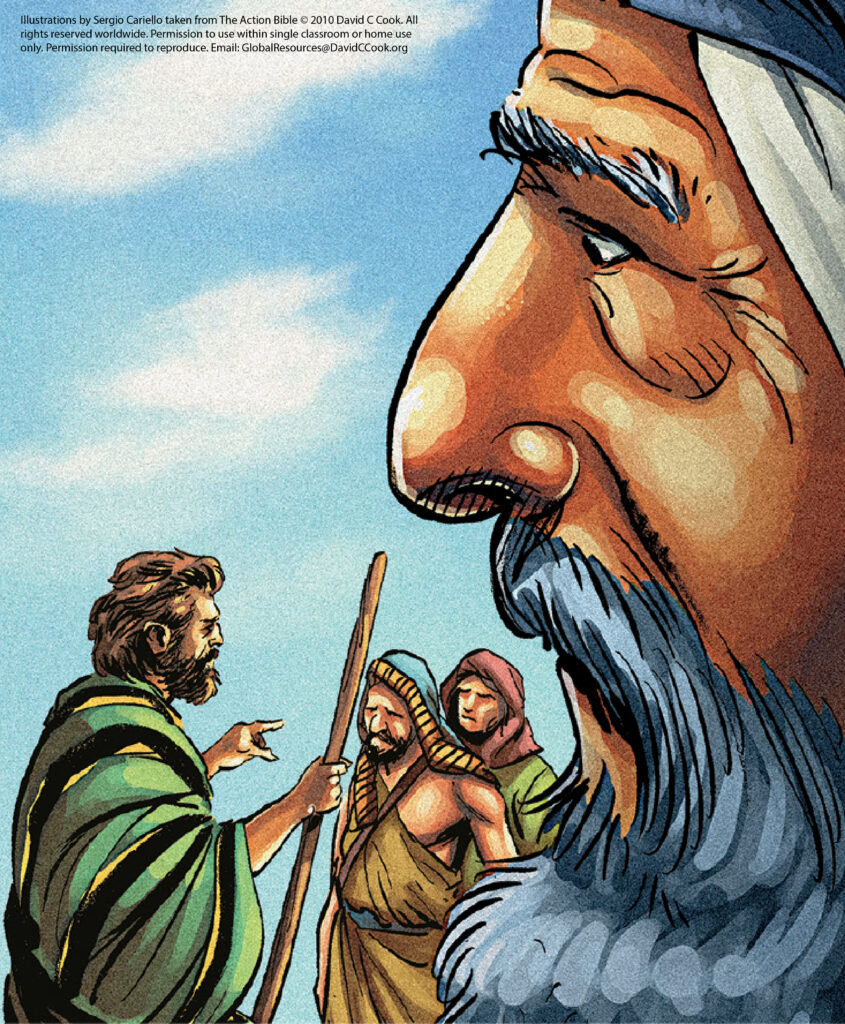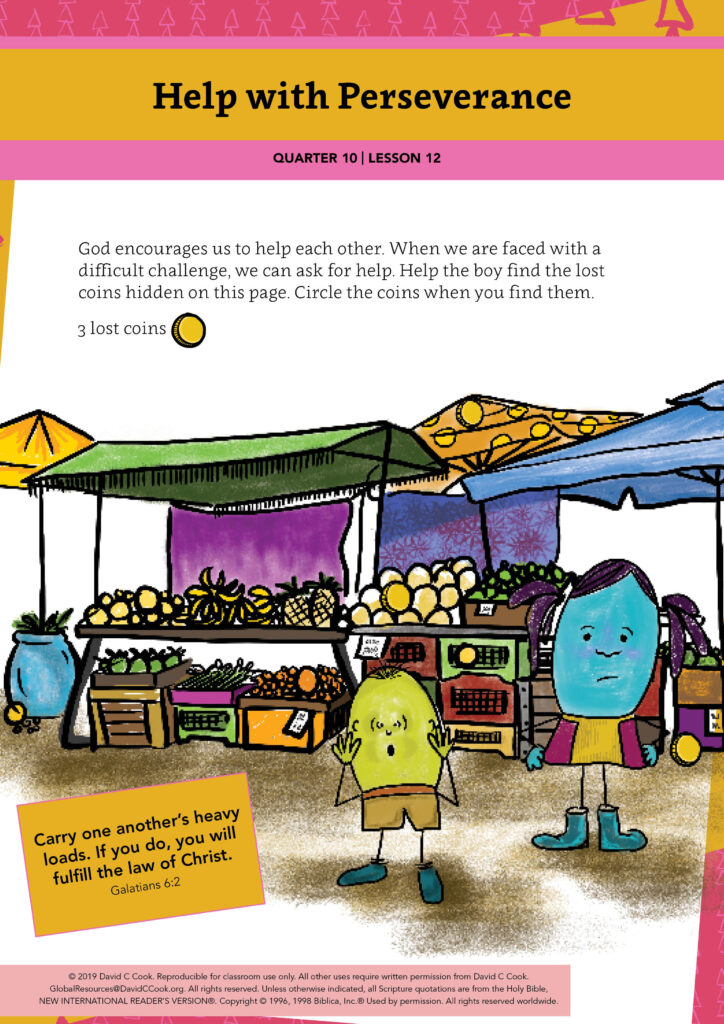During the lesson, the information for you to know is written in regular type, and what we suggest speaking or reading aloud to children is in bold. All resources for this lesson, including the Teacher Guide, Student Page, Family Connection Card, and other resources can be downloaded in a ZIP file by clicking on the following link:
In some lessons you will find "resource articles." These are articles written by experts from around the world to help equip you for your work with children and adolescents. Share them with parents or guardians if you consider it appropriate.
Before class, set the bucket in the front of your teaching area in a place where all of the children can see it. Fill it with stones. When the container is filled, it should be too heavy for a child to carry alone.
Carry one another’s heavy loads. If you do, you will fulfill the law of Christ.
Galatians 6:2
It is okay to ask for help. It can be easy to believe that suffering silently is a sign of a strong faith. We may think it is weak to be unable to bear our own burdens or that it is selfish to share our needs when others’ needs may seem larger than our own. So we try to persevere alone. However, when our burdens are heavy, we should remember that asking for help is part of God’s design, and it has benefits beyond the help we receive. Asking for help reminds us that our strength alone will never be enough—we need God’s help and the help of those around us.
The next time you feel you cannot persevere alone, ask for help. Ask God for the strength to bear the burden and the wisdom to know who you can ask to help. Sharing our loads can make even the heaviest burdens feel lighter. Next, ask for the prayer and support of the people God directs you to. Finally, help others with their own heavy loads. When you focus on the needs of others, the load you are carrying may not seem quite as heavy as you once thought. God calls us to be in community with one another.
Encourage the children’s families to ask their children to share situations they are facing that require perseverance. This gives the children an opportunity to ask for help with their challenges.
Teacher Tip: If possible, email or text the Family Connection Card to the families of your students.
Greet the children warmly as they arrive. Ask them to find partners as they enter the teaching space. Encourage them to talk with their partners about how they have practiced perseverance. Then choose a volunteer to stand next to the bucket.
Let’s do an activity that requires perseverance. We have been learning about perseverance, so we know that it means we do not quit and we keep trying. Moving this bucket filled with stones can help us to understand perseverance.
Ask the volunteer to try to move the bucket across the teaching space. He may be able to move it a short distance, but he probably will not get very far.
What can our friend do to practice perseverance in this situation?
Allow 2–3 children to respond.
Do you think he is working hard enough? Maybe he should work harder. What do you think?
Allow the children to call out their responses.
Encourage the volunteer to try to move the bucket a little farther. Allow 2–3 children to respond to each of these questions.
Let’s pretend this bucket must be moved across this space. What else can our friend do to solve this problem?
He can ask for help!
Allow the volunteer to choose someone to help him. Have that child help to move the bucket. They may continue sliding the bucket on the ground.
Allow the children to stand and line up near the bucket. Each child will take a stone out of the bucket. You will also need 1 or 2 children to carry the bucket with the stones that are left in it. Ask them to carry their items across the teaching space and bring them back to their original places in the front of the teaching area. Then have them bring their stones with them as they sit in a circle.
We learned something new about perseverance from this activity. We can ask for help! Today we will learn more about how we can practice perseverance by asking for help.
I will tell you a true story from the Bible. If you hear someone in the story ask for help to practice perseverance, raise your hand. Then, I will invite 4 of you to bring your stones and place them in the bucket.
As you read the story, the situations that required perseverance are underlined for you. When you see an underlined part of the story, invite 4 children to come and put their stones into the bucket. Once the children have put their stones in the bucket, they will return to their normal places.
This story happens after Moses led the Israelites out of Egypt. After the Israelites left Egypt, they did not have a place to live. They had to travel a long distance for a long time to reach where God told them to go. The Israelites had to practice perseverance on the long journey.
Invite 4 children to put stones into the bucket.
Traveling a long way for a long time would require perseverance.
Optional: If possible, share the image from The Action Bible.

During that time, Moses had a lot of important work to do. One of his jobs was to help the Israelites to solve their problems. When they did not agree, Moses helped them come to agreements. When they did not know God’s rules and instructions, they asked Moses. When they needed to know what God wanted them to do, they went to Moses. All day, from morning until evening, Moses sat in his tent, and the Israelites took turns asking for his help.
Invite 4 children to put stones into the bucket.
Listening to people’s problems, being patient with them, and helping them would require perseverance.
Moses’ father-in-law, Jethro, saw everything that Moses was doing. He saw that Moses was working too hard and needed help! Listen to what Jethro said.
If possible, read these verses directly from your Bible.
Moses’ father-in-law replied, “What you are doing isn’t good. You will just get worn out. And so will these people who come to you. There’s too much work for you. You can’t possibly handle it by yourself.
Exodus 18:17–18
Why did Jethro want Moses to ask for help?
Moses was tired, and serving as a judge was too much work for 1 person. Jethro also told Moses that the people needed to honour God by learning His laws.
Jethro told Moses there was too much work for him to handle alone.
Invite 4 children to put stones into the bucket.
Now, Jethro tried to help Moses so he could continue to persevere. Listen for things Jethro did to help Moses. When you hear something that you think helped Moses persevere, raise your hand. I will invite 3 children to remove 1 stone each from the bucket.
Each time you read about something that will help Moses persevere, ask 3 children to remove 1 stone each from the bucket. These things are underlined in the story below. Once the children have taken their stones from the bucket, allow them to return to their normal places.
Then Jethro gave Moses some advice to help him persevere. Jethro told Moses to continue taking the difficult cases himself. For all the other cases, Jethro told Moses to teach others God’s rules and instructions so they would know what to do.
Invite 3 children to remove 1 stone each from the bucket and place them next to it.
This would help Moses not to get too tired. Jethro suggested that Moses choose men who honoured God, and he gave him a way to divide the work. These men would do some of the work Moses had been doing.
Invite 3 children to remove 1 stone each from the bucket and place them next to it.
Moses did what his father-in-law said. This helped Moses. It was as if someone took some rocks out of his bucket to make his bucket lighter. This made it easier for Moses to do what God had called him to do.
Allow 3 children to remove 1 stone each from the bucket and place them next to it.
In our story, what did Jethro do to help Moses?
Jethro gave Moses advice.
We can practice perseverance when we ask others for help. We can also ask for their advice. Moses listened to the advice of his father-in-law, and this helped him to lead the Israelites in a better way.
At the beginning of the story, Moses’ job was like this bucket filled with stones. It was heavy, and it was hard work to carry it alone. He had to practice perseverance. Moses listened to the advice of his father-in-law and asked others to help him. Most importantly, he asked God for help. God can help us to practice perseverance, too.
How did Moses get help from others?
He asked others to share his work.
We can get help from others, too. Friends can encourage us and give us hope. They may help us to find new ways to solve our problems or help us with our work. We should ask for help from people we trust when we need to practice perseverance. I need 3 more children to come remove stones from the bucket to remind us we can also ask for help to persevere.
Allow 3 children to remove stones from the bucket and place them next to the bucket. Then ask them to go back to their usual places. Next, lift the bucket up and show the children that it is empty!
Like Moses, we can ask for help. Listen to what the Bible tells us about helping each other:
Carry one another’s heavy loads. If you do, you will fulfill the law of Christ.
Galatians 6:2
The Bible teaches us that we should help each other. When someone is going through a difficult situation, it is like he is carrying a heavy load. We should try to help that person to persevere. And when we need to practice perseverance, we do not need to do it all alone. We can ask for help. Here are some things you can do when you need help practicing perseverance:
Let’s practice asking for help in persevering by acting out how we can respond when we need help from others.
Have the children pair up for the next activity. Have girls partner with girls and boys with boys.
We all have times when we need help to persevere. Think about 1 or 2 people you can ask to help when you need to persevere through something. They may be people who can help you with the difficult thing you need to do, people who can give you good advice, or people who can listen to your problems.
Give the children 1 minute to think of people they can trust to help them with perseverance.
After I read the following situation, you and your partner will act out what you can do to get help to persevere.
Situation 1: You hurt your ankle running and cannot walk well. You need to go to the clinic. Your friend walks by and sees you. What will you do? One person in each pair will pretend to have a hurt ankle, and the other will pretend to help him. Pretend that the clinic is this part of the teaching space.
Point to part of the teaching area that the children can pretend is the clinic. Then give them about 3 minutes to act out how they would respond to the situation. Most of them will try to help their friends walk over to the clinic.
Great! Those of you who were hurt asked for help, and those of you who were the friends responded. Let’s practice again with another situation. This time, the person who helped last time will be the person who needs help in this next situation.
Situation 2: You are at the market with your older sister. You realize you have lost the money you were given to buy vegetables. You feel like crying and running away. What will you do? Pretend that this is the market.
Point to part of the teaching area that the children can pretend is the market. Then give them about 3 minutes to act out how they would respond to the situation. Most of them will probably help look for the money.
Optional: If you are using the Student Pages, give the children crayons. Allow 2–3 minutes for them to do the activity on their pages.

Sometimes we need help to persevere. Our memory verse reminds us that it is important to persevere.
If you are using the Memory Verse Poster, show it to the students.
We want you to be very strong, in keeping with his glorious power. We want you to be patient. We pray that you will never give up.
Colossians 1:11

Repeat the verse and motion with the children 3 times. End class by saying a blessing, based on Proverbs 1:5, over the children.
Blessing: May you be wise in asking for help when you need it. May you trust God to give you strength and wisdom in your times of difficulty.
Lead the children in singing this quarter’s song, if possible.
Life on Life ©2020 David C Cook. Reproducible for home or classroom use only. All other uses require written permission from David C Cook [email protected]. All rights reserved.